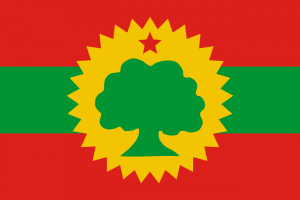Language/Borana-arsi-guji-oromo/Vocabulary/Common-Greetings
Introduction
Karibu! (Welcome!) In this lesson, you will learn common greetings in Borana-Arsi-Guji Oromo, spoken by the Oromo people in Ethiopia and Kenya. Greetings are an important part of Oromo culture, and knowing them is essential for building relationships and connections within the community. As a complete beginner, it's important to familiarize yourself with formal and informal variations to avoid offending anyone accidentally.
Formal Greetings
Formal greetings are used with strangers, elders, and in formal settings such as meetings, interviews, and events. Using formal greetings is a sign of respect and politeness.
Hello – Akkam?
| Borana-Arsi-Guji Oromo | Pronunciation | English |
|---|---|---|
| Akkam? | [a-kam?] | Hello |
How are you? – Nagaade?
Nagadde? is a common greeting used to ask how someone is doing. This question can be used in formal or informal contexts.
| Borana-Arsi-Guji Oromo | Pronunciation | English |
|---|---|---|
| Nagadde? | [na-ga-dde?] | How are you? |
I'm good – Nagaadhu
Nagaadhu is the most common way to respond to Nagadde?.
| Borana-Arsi-Guji Oromo | Pronunciation | English |
|---|---|---|
| Nagaadhu | [na-ga-dhu] | I'm good |
Thank you – Galatoomi
Galatoomi is a polite way to express gratitude in Borana-Arsi-Guji Oromo. You can use it in formal and informal contexts.
| Borana-Arsi-Guji Oromo | Pronunciation | English |
|---|---|---|
| Galatoomi | [ga-la-to-o-mi] | Thank you |
Informal Greetings
Informal greetings are used with family members, friends, and people of similar age or younger. They are less formal and more casual than formal greetings.
Hi – Sannu
Sannu is a common way to greet someone informally. It can be used to greet peers, friends, or someone younger than you.
| Borana-Arsi-Guji Oromo | Pronunciation | English |
|---|---|---|
| Sannu | [san-nu] | Hi |
What's up? – Malaas?
Malaas? is a common way to ask how someone is doing informally. It's a shorthand way of asking "what's up?" in Borana-Arsi-Guji Oromo.
| Borana-Arsi-Guji Oromo | Pronunciation | English |
|---|---|---|
| Malaas? | [ma-laas?] | What's up? |
I'm good – Malaasni dhufe
This is the most common way to respond to Malaas?. Malaasni dhufe means "I'm good" or "I'm fine".
| Borana-Arsi-Guji Oromo | Pronunciation | English |
|---|---|---|
| Malaasni dhufe | [ma-laas-ni dhu-fe] | I'm good |
Cultural Notes
When greeting someone in Borana-Arsi-Guji Oromo, it's important to note that the language has different levels of politeness and formality. You should use formal greetings when addressing people you don't know or elders.
Additionally, greetings are considered very important in Oromo culture, and it's customary to exchange greetings around the family compound or village. During the exchange of greetings, it is customary to enquire about the health and well-being of the other party and their family.
Conclusion
Congratulations! You've learned common greetings in Borana-Arsi-Guji Oromo. Knowing greetings is an important part of communication in any language and culture, and you've taken the first step in building relationships with Oromo-speaking people. Keep practicing and have fun!

